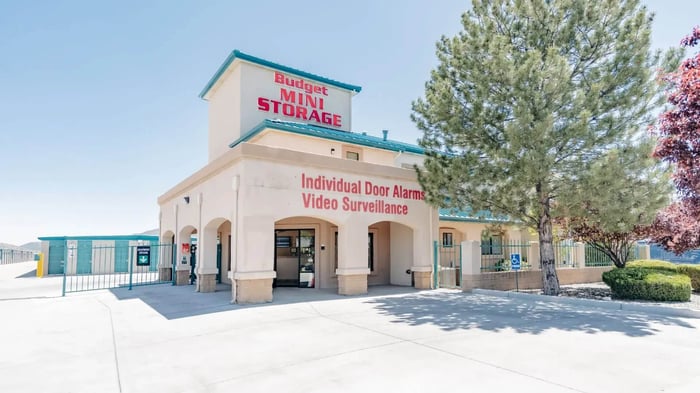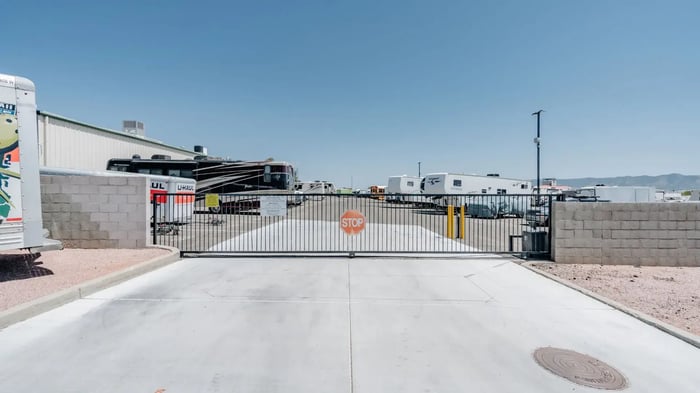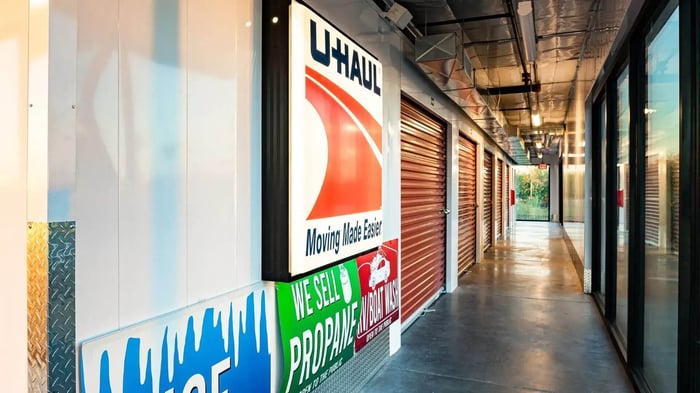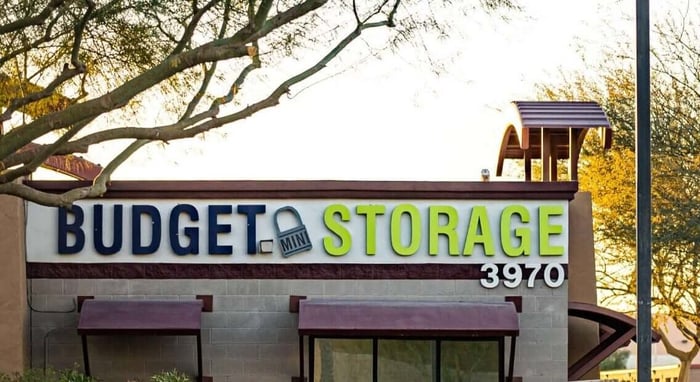Storing furniture properly can feel overwhelming, but with the right preparation, you can ensure your belongings stay protected, organized, and in great condition over time. Whether temporarily downsizing, relocating, or clearing out some room in the house, this guide will give you detailed storage tips to help you maximize your storage space in Prescott Valley, AZ.
Choosing the Right Storage Unit Size
The first step is selecting a storage unit that fits your needs. Understanding your required space is crucial to avoid overpaying or struggling with a cramped area.
Assess Your Inventory
Start by creating a detailed list of the furniture and other belongings you plan to store. Take note of bulky items like couches, appliances, or dining tables, as well as smaller things such as boxes of clothes or household items. An inventory helps you estimate the appropriate storage space while keeping you organized.
Consider Future Needs
If you anticipate adding more items in the future, consider renting a larger unit to ensure you don’t run out of space. For instance, your family’s needs might evolve, or you may want to store seasonal items later on.
Standard vs. Climate-Controlled Units
Some belongings, like wooden furniture, leather couches, or fragile antiques, can be affected by changing temperatures and high moisture levels. If your items require protection from extreme temperatures or humidity, opt for a climate-controlled storage unit.
Preparing Your Furniture for Storage
Proper preparation is key to keeping furniture in excellent condition during storage—whether you're loading it into a unit directly or transporting it in a truck. This step ensures maximum protection and prevents long-term damage.
Clean and Dry All Items
Before you wrap or cover anything, clean your furniture thoroughly. Dust, dirt, or stains can become harder to remove, especially under plastic or blankets. Also, ensure items are completely dry to avoid excess moisture that could lead to mold or mildew.
Disassemble Bulky Pieces
Where possible, disassemble items like beds, tables, or modular sofas. This makes them easier to transport and stack and prevents accidental damage. Keep hardware like screws or bolts in labeled plastic bags and tape them securely to the corresponding pieces.
Disassembling Furniture for Efficient Packing
Breaking down furniture before storage saves space and provides better protection. Follow these steps to disassemble items safely:
Step 1: Gather Proper Tools
Have basic tools like screwdrivers, wrenches, and packing supplies ready. It’s helpful to keep a list of what each item requires so nothing gets overlooked during reassembly.
Step 2: Wrap Fragile Sections
For delicate parts like glass tabletops, wrap them carefully with moving blankets or bubble wrap. Label them as fragile to ensure they’re handled with care during delivery and storage.
Step 3: Keep Hardware Secure
Place bolts, screws, and other small components in resealable bags. Label each bag with the name of the furniture piece, and tape it to the underside of the furniture for easy access.
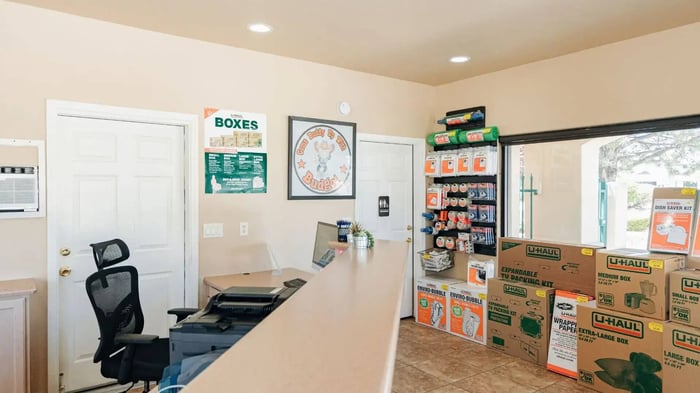 Store your furniture safely at Budget Mini Storage – East 2nd Street in Prescott Valley. We also offer packing supplies for a smooth and secure storage process.
Store your furniture safely at Budget Mini Storage – East 2nd Street in Prescott Valley. We also offer packing supplies for a smooth and secure storage process.Protecting Furniture with Covers and Padding
Using proper padding and coverings will shield your belongings from dust, scratches, and impacts.
Use Protective Materials
Invest in durable covers like plastic or moving blankets to wrap furniture pieces securely. Avoid wrapping items like leather furniture directly in plastic for long periods, as this can trap moisture. Instead, use breathable fabric covers.
Secure Items with Tape
After wrapping, use packing tape or stretch wrap to secure the covering. This ensures the protection stays in place throughout transportation and storage.
Elevate and Arrange Furniture
Elevate furniture off the ground using wooden pallets or risers to protect against unexpected moisture in the storage unit or trailer. Arrange items carefully, leaving space for ventilation and easier access if you need something later.
Organizing the Storage Unit Layout
A well-organized storage unit can save you time and energy whenever you need to retrieve your belongings.
Create a Storage Map
Sketch out the layout of your storage space, arranging items by size and frequency of use. Place items you’ll need access to more frequently near the front.
Stack Smartly
Stack lighter boxes on top of heavier ones to prevent crushing. Fragile boxes and those containing important items should be kept near the top so they won’t be damaged or difficult to retrieve.
Leave Aisles for Access
Arrange furniture so that walking paths are available, making it easy to reach the back of the unit when needed.
Maximizing Space with Vertical Stacking
Storage units are often more spacious vertically than they appear. Use this to your advantage to stack and save room.
Use Sturdy Boxes
Invest in quality, sturdy boxes that won’t lose shape or collapse under weight. Label each box clearly with its contents and the room to which it belongs.
Protect the Top Layers
Ensure fragile items at the top of the stack are well-cushioned. Cover them with blankets for additional protection.
Avoid Overloading
Don’t stack so high that it creates an unsafe situation or makes accessing items inconvenient.
Labeling Boxes and Items
Proper labeling makes it easy to find what you’re looking for without unpacking every box.
Label Clearly
Use bold, readable letters to label each box with the name of its contents, the room it belongs to, and its level of fragility. For example, "Kitchen Items - Fragile - Top Shelf."
Create a Master List
Maintain a master list of all labeled boxes, noting their contents and location in the unit. This is especially helpful if you have a lot of belongings in storage.
Climate-Controlled vs. Standard Units
When to Choose Climate Control
Furniture like wooden tables, leather chairs, and antiques requires protection from fluctuations in moisture and temperature. A climate-controlled unit ensures stability and prevents issues like warping or cracking.
Standard Units for General Storage
If you’re storing less sensitive items like metal furniture or plastic containers, a standard storage unit will often meet your needs at a lower cost.
Accessing Your Stored Furniture
You’ll want to make retrieving items from storage as seamless as possible.
Keep Commonly Used Items Handy
Arrange items you might need frequently, such as seasonal clothes or important documents, near the front of the unit for easy access.
Create a Clear Pathway
Leave enough space between stacks of furniture and boxes to move around without unpacking everything.
Tips for Long-Term Storage Stability
If you’re storing furniture for an extended period, a few additional tips can help keep it in top condition.
Protect Against Dust
Use breathable covers to shield your belongings from accumulating dust while allowing for ventilation.
Monitor Moisture
Place moisture absorbers or dehumidifiers in the storage space to keep humidity levels in check.
Secure Your Unit
Ensure all furniture is properly wrapped and labeled, and double-check that the storage unit is locked and secure to protect your belongings.
With these tips, you can store your furniture in Prescott Valley, AZ, with peace of mind. By following these steps, your items will remain well-protected, organized, and ready for use when you need them again.
Need Help Finding the Right Storage Solution?
Finding a storage solution that fits your needs can feel daunting. But with the right guidance, you can easily and safely organize your belongings. Whether you're a family storing items during a move or a small business needing extra inventory space, you deserve a solution tailored to your unique situation.
At Budget Mini Storage – East 2nd Street, we understand that choosing the right storage unit is crucial for your family's needs. Our customer service team is dedicated to assisting you in selecting the perfect unit and ensuring your belongings are stored securely and conveniently.
Comprehensive Services to Meet Your Needs
We offer a range of services designed to make your storage experience seamless:
- Drive-Up and Interior Storage Units: Choose between easily accessible drive-up units or secure interior options, all featuring heavy-duty roll-up doors for hassle-free entry.
- Moving Supplies: Stock up on essential packing supplies, such as boxes, tape, and blankets, to protect your items during transit and storage.
- Online Payments: Manage your account effortlessly with our online payment system, offering flexibility and convenience.
- On-Site Manager: Our resident manager is available to address any questions or concerns, providing personalized customer service.
Final Thoughts: Store Smarter, Not Harder
At the end of the day, finding the right storage solution is about more than just the size of the unit; it’s about the entire experience. With competitive pricing, exceptional customer service, and secure, well-organized storage spaces, you can meet your needs without stress. Whether it’s a family move or storing seasonal items, STORAGExperts makes the process simple and hassle-free for all our customers.
Stop worrying about where to put your things. Visit our office today to explore available services, check current rates, and get the details you need to make an informed decision for your belongings.
Ready to get started? Contact us today or stop by for a tour—we’re here to help you organize your space and protect what matters most.
Frequently Asked Questions
What size storage unit do I need for my furniture?
The size you need depends on the amount and type of furniture. A 5x10 unit is ideal for a small room’s contents, while a 10x10 can hold the furniture from a one-bedroom apartment. For larger items or multiple rooms, consider a 10x20 or larger. Always assess your inventory beforehand to determine the best fit.
Should I disassemble furniture before storing?
Yes, disassembling furniture like tables, bed frames, and large shelving units saves space and prevents damage. Keep screws, bolts, and small parts in labeled bags and tape them to the corresponding piece for easy reassembly.
What protective materials should I use for storage?
Use furniture covers, moving blankets, and bubble wrap to protect surfaces from dust, scratches, and moisture. For items like wooden furniture, opt for breathable covers to allow airflow and avoid plastic that might trap moisture.
How can I prevent mold in a storage unit?
Ensure all items are clean and thoroughly dry before storing. Use moisture absorbers or dehumidifiers in the unit. Elevate items on pallets to improve airflow and prevent contact with potential moisture on the floor.
Can I store upholstered furniture in a storage unit?
Yes, upholstered furniture can be stored if prepared properly. Clean and dry it thoroughly, wrap it in breathable fabric covers, and consider using a climate-controlled unit to prevent temperature and humidity damage. Always elevate it to protect against possible moisture.

